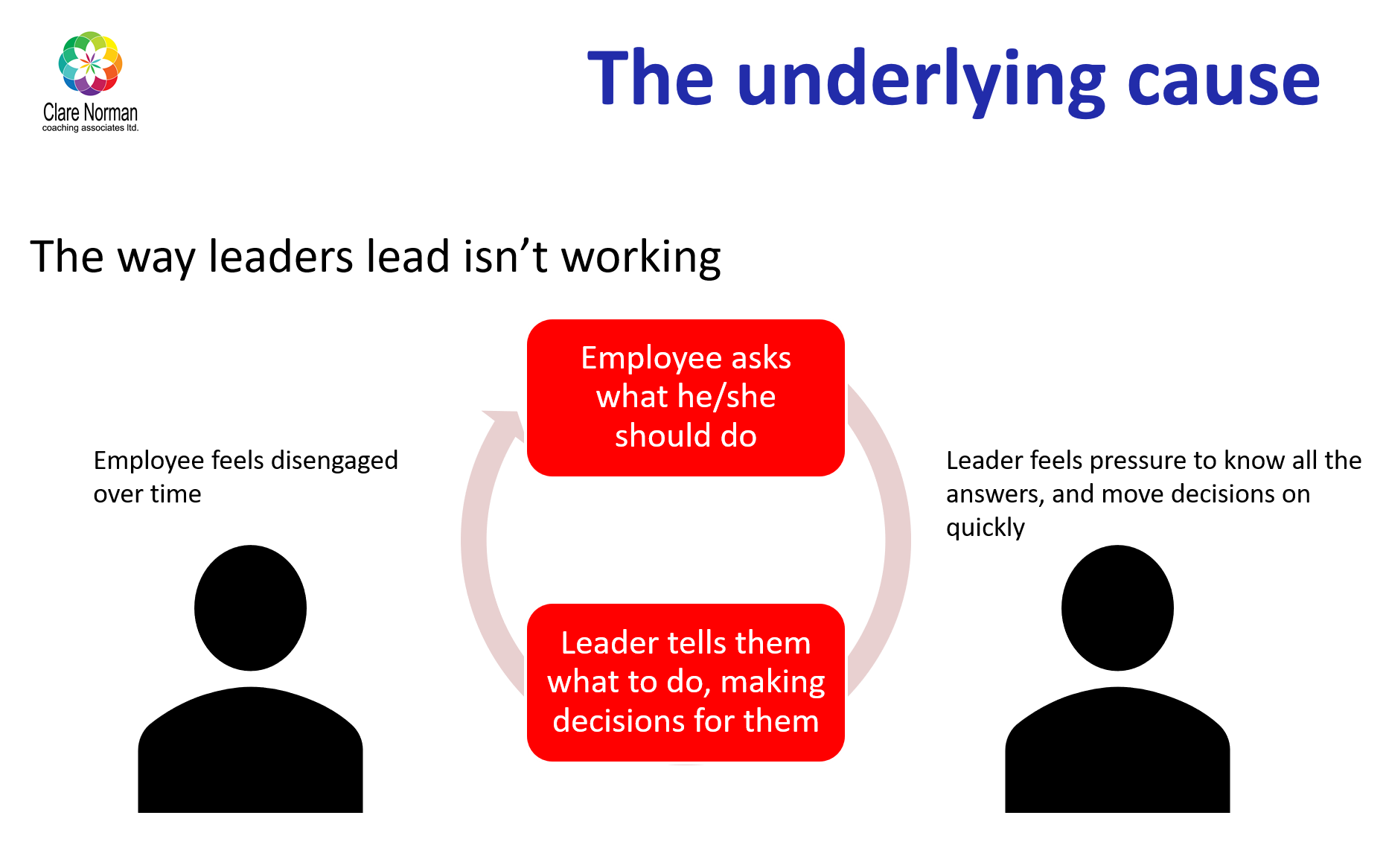Why Build a Coaching Culture? Ask yourself these questions…
Do you ever notice yourself feeling overwhelmed by the amount of work you need to get done, with not enough time to get it done?
Do you ever notice how you go straight in to problem solving mode when a team member asks you a question?
Do you ever think that there might be a connection between these two?
Lack of time is tied to solving others’ problems.
Here’s what I see happening….
An employee asks his or her manager what to do in a situation. Said manager feels the pressure to have all the answers and/or to move decisions on quickly, so gives an answer. This is a good short-term fix, as the employee can go away and take action (maybe, if they actually understand the answer fully), and the manager gets to go back to their work.
But it keeps happening. The same employee comes back with similar or additional questions. They get into a habit of feeling that they should ask permission rather than forgiveness. The amount of time the manager spends on decision-making just keeps on increasing.
Why can’t the employee figure it out for themselves, the manager wonders?
“They’re not new anymore, they should know what to do, after all the answers I’ve given them! I never get around to doing the more strategic thinking that I need to get to, as I’m always helping my team members. I’m feeling unfulfilled and under-challenged”.
Sound familiar?
At the same time, the employee is feeling equallyunfulfilled, as he/she just does what they’re told. They don’t have to think, but that’s leaving them feeling under-challenged.
You’re both in the same boat, unfulfilled, under-challenged, not able to operate at the level for which you are paid. It’s a vicious cycle, which is dragging you both down. The more you answer the questions about decisions they could make for themselves, the more they will come back with more questions, and so it continues.
You, the leader, are feeling tugged in two directions:
- From below, by employees wanting advice, direction, decisions
- From above, by your leaders wanting them to spend more time on the future of the business

Look around you. Do you see that happening around the organisation? Decisions being made at too high a level? Strategic thinking not being given the time it needs? No diversity of thinking, so little innovation. Chances are that this is a cultural norm.
But it could be different. There is another way.
It takes just one small tweak on your part:
Asking instead of telling.
Asking them what they think about the situation and the possible resolutions.
Yes you might need to ask a series of questions to help them to decide what next step to take; and yes that might take a bit longer than telling them what to do.
But in the long-term, they’ll stop asking you and start asking themselves.
So stop blaming them for coming to you with their questions. You are perpetuating that behaviour by always answering those questions, making their brains lazy. Look to yourself and how you can change that one small behaviour to enable them to change theirs.

Think about the return on that short-term investment of additional time:
- You’ll have more time in the long-term to focus on those strategic issues that you are being held accountable for
- You’ll feel more fulfilled that you have helped someone else to grow
- You’ll feel more challenged because you are working on those strategic issues
- Your employees will be getting more done, because they won’t need to wait until they can talk to you
- They will feel more fulfilled as a result of getting more done
- They will feel more challenged, as they will be using their brain to solve problems
- They will be growing, and your succession plan will be much healthier
- They will feel more engaged, and will be more likely to stick around for longer
- They will be experiencing a more effective approach to management, that they can then use with their own team members
Multiply that by all the managers in your organisation and think what a difference that will make to the productivity and growth of the organisation as a whole. All because you encouraged diversity of thinking and innovative ideas in others.
Is that enough to persuade you that it’s worth that small tweak, asking instead of telling?
Pushing decision-making down to the level at which those decisions should be made?
Freeing up time for good quality thinking?
Creating diversity of thinking and innovation?
Picking up the pace on performance?
Building a culture of coaching?
We don’t build a coaching culture for its own sake. We build a coaching culture to meet business needs, for the present and for the future.
The most prevalent business need that I see is the growth of a business, created by the growth of individuals in that business.
After their initial training, the growth of the individuals comes from asking rather than telling.
We are all paid for our capacity to think. Yet we waste that capacity, if we don’t ask our employees to think. They aren’t using their brainpower, and we are using our brainpower on things that are beneath our pay grade, rather than on the strategic thinking that we are paid for.
Perseverance is Key
It’s true that not all of your employees will step up at your invitation. Remember they have formed a habit and it takes a while to unlearn habits and relearn new ones. So persevere. But if they still don’t rise to the challenge, it may be time to manage them out of the system or into a better fitting role.
You can make a difference, even if you are the only person asking instead of telling. Try it and see what kind of a ripple effect it creates.
If it helps to get you on the right path, you might want to ask for coaching yourself, to experience the power of questions rather than advice.
Cultures change one person at a time. Start now and you’ll see the difference in performance that your bosses are expecting of you.




